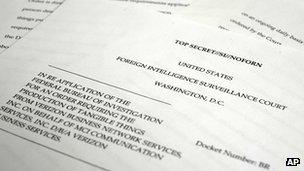US media review: NSA revelations on Prism
- Published

An order of the US Foreign Intelligence Surveillance Court requires phone company Verizon to pass information to the NSA
The reports of a secret court document on phone record collection, followed by claims in The Guardian and The Washington Post about Prism - an alleged programme to tap into the servers of internet companies - are being extensively discussed in the US media.
Many commentators believe a debate is needed on how much intrusion into Americans' privacy is acceptable in the interests of national security.
The Washington Post asks, external why Americans did not know about the phone surveillance programme until now. The paper says that the public needs more explanation to be able to make a reasonable assessment of whether these programmes are worth the security benefits.
In a blistering editorial, the New York Times also calls for greater explanation, external. Accusing the Obama administration of issuing "platitudes", the paper says the president "is proving the truism that the executive branch will use any power it is given and very likely abuse it".
Drawing parallels with the seizure of Associated Press phone records and the killing of US citizen Anwar al-Awlaki in 2011, the administration's assurances have never been persuasive, it claims.
Questioning the apparent use of the Patriot Act to get hold of the Verizon phone records, the paper argues the legislation should be sharply curtailed, if not repealed.
The Los Angeles Times, external says this week's disclosures underscore how US intelligence and law enforcement now "secretly glean vast amounts of information from communications technology".
Phone and internet users' ability to challenge the practices will be limited by the fact that legally much of the data is considered to belong to the companies, not individual service users, the paper reports.
'Another policy disappointment'
The San Francisco Chronicle, external says the collection of millions of phone records "conducted with only the barest legal oversight" is "another policy disappointment from a president who came to office promising to ease the worst of the panicky, ill-considered policies launched after the Sept. 11 attacks 13 years ago".
Writing on The Daily Beast, external, Megan McArdle describes surveillance as "an indiscriminately bipartisan vice". Regardless of who is in the White House, they will secretly collect massive pools of data on US citizens, she claims. Likening the practice to East Germany, she fears that Americans will "yawn" at allegations of "spying".
Alexander Bolton on The Hill, external reports that senators had been aware of the administration's surveillance practices "for years", though some lawmakers said they "do not remember being briefed on the full extent of intelligence activities".
'Nightmare'
On the libertarian Hit & Run blog, external, Peter Suderman argues that congressional legislators have "actively resisted even modest attempts at oversight... under the pretence that those modest efforts would undermine national security".
On the Huffington Post, Susan Landau argues, external, referring to an earlier scandal, external, that journalists are the "canaries in the coal mine" - the first to suffer privacy violations in the name of surveillance.
"The invasiveness of this data is hard to underestimate," she writes, providing a "treasure trove that the Stasi [East German secret police] could only dream of.
"That it is occurring in the United States is a nightmare."
- Published7 June 2013
- Published7 June 2013
- Published6 June 2013
- Published6 June 2013
- Published15 May 2013
- Published15 May 2013